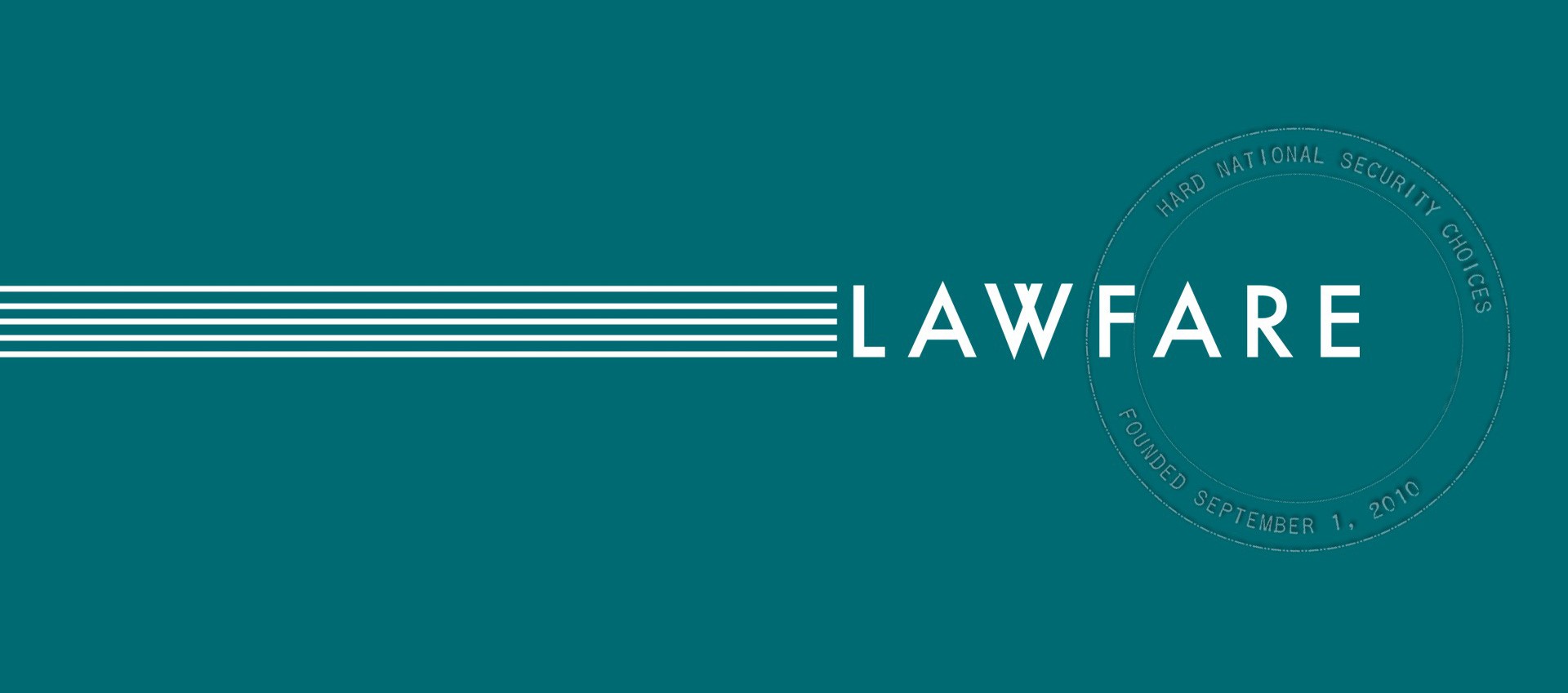The Week That Was: All of Lawfare in One Post
Your weekly summary of everything on the site.

Published by The Lawfare Institute
in Cooperation With

Tyler McBrien and Katherine Pompilio reported from the New York County Supreme Court in Manhattan, where Justice Juan Merchan set a trial date in the criminal case relating to former President Donald Trump’s alleged plot to pay hush money to adult film actress Stormy Daniels and others in the run-up to the 2016 election. Merchan heard argument on Trump’s motion to dismiss the case on the grounds of the Manhattan District Attorney’s Office’s alleged discovery violations related to the production of records by the Southern District of New York.
Roger Parloff explored how a prosecutor can challenge jury instructions by considering two past cases—one successful, and one not—in light of District Judge Aileen Cannon’s order regarding prospective jury instructions in the special counsel’s classified documents case against Trump.
Jack Goldsmith and Tom Koenig examined the technical puzzles that arise from the legal basis of the Supreme Court’s order granting certiorari in Trump’s immunity appeal.
On March 28, Benjamin Wittes sat down with Parloff, Anna Bower, McBrien, Quinta Jurecic, and Pompilio for this week’s episode of “Lawfare Live: Trump’s Trials and Tribulations.” If you couldn’t attend the live event, the recording is available on Lawfare’s YouTube channel or over the weekend on the Lawfare Podcast feed:
On March 14, Lawfare launched a new page where you can find all of our coverage of the New York criminal trial against Trump relating to alleged hush money payments made during and after the 2016 election.
On Rational Security, Alan Z. Rozenshtein and Jurecic were joined by McBrien and Daniel Byman to talk over the week’s national security news. This week’s topics included the ISIS-K terrorist attack against a concert hall outside of Moscow that killed over 130 people, the April 15 start-date of Trump’s hush money trial in Manhattan, Judge Cannon’s “strange” order in Trump’s classified documents case in Fort Pierce, Florida, instructing both parties to “engage with” potential jury instructions, and more:
Byman discussed the recent terrorist attack by the Islamic State Khorasan Province (ISIS-K) on Crocus City Hall in Moscow. He argued that although it is an indication of an increase in violence by the jihadist group, the overall decline in activity by the Islamic State counterbalances its overall effect.
On the Lawfare Podcast, Wittes sat down with Benjamin Nathans to talk about the legacy of Alexei Navalny—the well-known Russian dissident who died in prison back in February. They talked about his life and death, how his passing was related to the sham elections in Russia and the protests that he earned in response to those elections, whether there is anybody who can carry the flag that he bore going forward, and more:
Maya Nicholson shared Resolution 2728, adopted by the UN Security Council on March 25, which “demands an immediate ceasefire” in Gaza for the month of Ramadan.
McBrien also shared an order from the International Court of Justice, indicating additional provisional measures for Israel to open humanitarian aid crossings in Gaza in the case of South Africa v. Israel.
On the Lawfare Podcast, Wittes sat down with Emma Tsurkov to discuss her sister, Elizabeth Tsurkov—an Israeli graduate student from Princeton who was kidnapped last year in Baghdad and is still being held by the terrorist organization Kata'ib Hezbollah. After Emma Tsurkov held a rally for her sister outside the Iraqi embassy, they talked about her sister’s case, which government is responsible for securing her release, and more:
In this week’s installment of Lawfare’s Foreign Policy Essay series, Christina Bouri explained how regional actors in the Middle East need to take a more vigorous approach in addressing climate-related migration, in light of climate change acting as a threat multiplier and further exacerbating the refugee crisis.
Yashar Parsie examined how New START—the nuclear arms reduction treaty between Russia and the United States—is deteriorating due to Russia’s suspension of the agreement and failure to comply with its verification measures, in addition to political tensions from the ongoing conflict in Ukraine.
On Chatter, Shane Harris sat down with Annie Jacbobsen to discuss her book, “Nuclear War: A Scenario,” which imagines a minute-by-minute and occasionally second-by-second account of how the vast U.S. national security apparatus would respond to a “bolt out of the blue” attack with a nuclear weapon. They talked about the present threat of a nuclear world war, her body of work, which has dug deeply into the dark corners of intelligence and national security, and more:
Ilya Somin outlined Texas’s argument in two cases in front of the Fifth Circuit that illegal migration and drug smuggling qualify as an “invasion” and authorize the state “to engage in war” as a response under Article I of the Constitution. Somin explained why the argument is unfounded and could have dangerous consequences if the courts accept it.
Jurecic evaluated the most recent draft of the Kids Online Safety Act (KOSA), which aims to impose requirements to protect minors online. She considered how the bill has changed, such as the duty of care provision and the shift of focus away from Section 230, and what that means for the complexity of tech policy going forward.
Justin Levitt explained why in the Supreme Court case of Murthy v. Missouri—which will assess the coercive potential of the federal government—it's important to consider different presidential administrations' varying approaches to platform governance.
On the Lawfare Podcast, Matt Gluck sat down with Wittes, Goldsmith, Jurecic, and Chuck Rosenberg to discuss Special Counsel Robert Hur’s report declining to prosecute President Joe Biden for his handling of classified material. They also unpacked the history of the special counsel institution and its predecessors, its current flaws, how it should change, and more:
Matthew Burtell and Helen Toner posited that although the Biden administration’s measures to establish clear rules and standards for government use of artificial intelligence (AI) are a good starting point, the development of the tools necessary to evaluate the technology are still far behind.
Michael Depp evaluated the United State’s most recent update to its Political Declaration on Responsible Military Use of Artificial Intelligence and Autonomy–a blueprint to set the tone for the international debate on military AI and autonomy. Depp explained that while the new changes made to the declaration are significant, the United States should accumulate more signatories and increase its efforts on human control of nuclear weapons.
Lennart Heim, Markus Anderljung, and Haydn Belfield examined how computing power–or compute–governance can be used as a tool to govern artificial intelligence.
Karine Bannelier and Eugenia Lostri discussed the United Nations Ad Hoc Committee to Elaborate a Comprehensive International Convention on Countering the Use of Information and Communications Technologies for Criminal Purposes’s attempts to draft an international cybercrime convention. They outlined key disagreements on core provisions of the draft convention, such as its scope of criminalization, obligations for international cooperation, and types of safeguards to protect against abuse and human rights violations.
On the Lawfare Podcast, Natalie Orpett and Brandon Van Grack sat down with Brett Leatherman to discuss the risk of cyberattacks. They discussed the FBI's recent operations to respond to cyberattacks, threats from both state actors and criminal gangs, and the role of the private sector in U.S. cybersecurity:
In the latest edition of the Seriously Risky Business cybersecurity newsletter, Tom Uren discussed the U.S. and the U.K.’s indictment of individuals linked to APT31–a hacking group allegedly tied to Chinese intelligence services–and a report by the Foundation for Defense of Democracies advocating for a stronger and more skilled U.S. Cyber Command, and more.
Also on the Lawfare Podcast, Wittes sat down with Shannon Togawa Mercer to talk about her odd area of legal practice as a cybersecurity and privacy lawyer who negotiates with ransomware bad actors. They discussed the legality of negotiating and paying off ransomware gangs themselves, the logistics of these negotiations, and more:
And on March 28, Lawfare announced its first auction item on the Givebutter campaign–a one-of-a-kind Lawfare jigsaw puzzle autographed by Wittes and the whole team. Place your bids to support Lawfare’s Trump Trials coverage, while having hours of fun putting it together and identifying the signatures of your favorite podcast commentators. You can also support Lawfare’s Trump Trials coverage by making a contribution here.
And that was the week that was.



